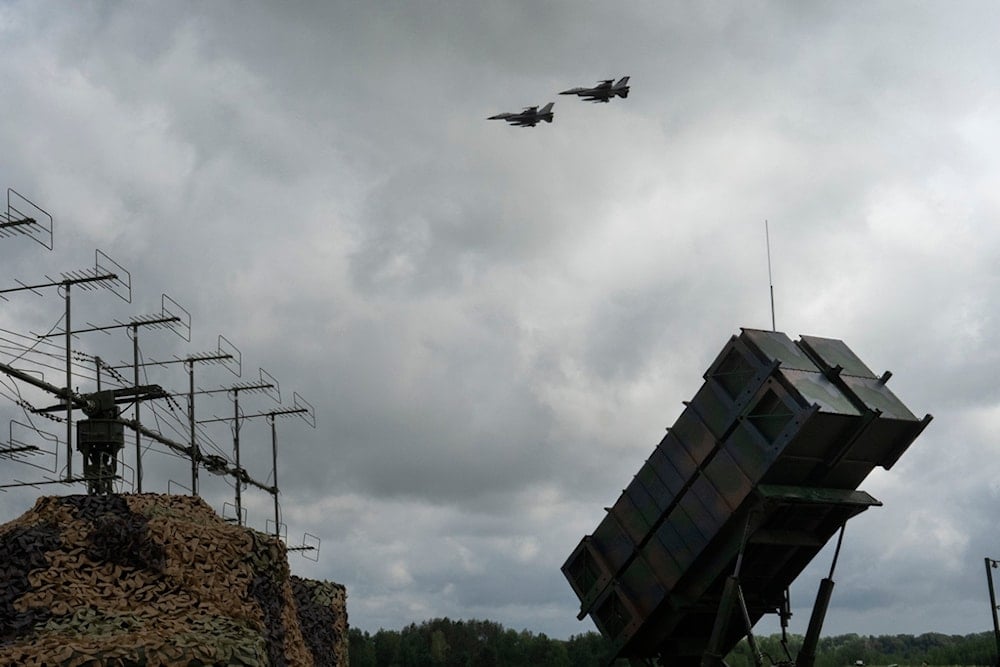Zelensky confirms Israeli Patriot operating in Ukraine
Zelensky's announcement that a US-made Patriot battery allegedly provided by "Israel" is operating in Ukraine indicates Washington's expanding proxy network.
-

The Ukrainian Air Force's F-16 fighter jets fly over a Patriot Air and Missile Defense System in an undisclosed location in Ukraine, Sunday, Aug. 4, 2024. (AP)
Ukraine has confirmed that it is now operating a US-made Patriot air defense battery delivered by "Israel", a development that signals deeper Western interference.
"The Israeli (Patriot) system is operating in Ukraine. It has been operating for a month. We will receive two Patriot systems in the fall," President Volodymyr Zelensky told reporters after returning from the UN summit, where he met with US President Donald Trump.
While Kiev portrays the move as a step toward protecting its skies, the introduction of a system said to be supplied by "Israel" indicates that NATO and its partners are effectively seeking to widen the battlefield.
Washington's double standard
The United States' decision to transfer Israeli arms to Ukraine unveils a longstanding hierarchy in Washington's global priorities. "Israel" has for decades enjoyed privileged access to advanced American weaponry and nearly unconditional military aid, often at the direct expense of other US clients. Ukraine, by contrast, has been subject to wavering congressional debates, funding delays, and restrictions shaped by domestic political divisions.
Though Trump has frequently clashed with NATO and criticized the alliance, the move still serves the broader US goal of intensifying military pressure on Russia, using allies like "Israel" as instruments of escalation rather than independent actors.
'Israel's' pivot under US pressure
Historically, "Israel" balanced its Western alignment with pragmatic coordination with Moscow in Syria, maintaining a direct deconfliction channel after Russia's 2015 intervention to prevent accidental clashes. This arrangement helped contain escalation even as "Israel" repeatedly violated Syrian sovereignty through unilateral airstrikes, which Russia's presence helped limit and de-escalate.
That fragile diplomacy is now deteriorating under mounting US pressure linked to the war in Ukraine. Zelensky's admission that a US-made Patriot system "from Israel" has been operating in Ukraine indicates that "Israel" is aligning more closely with Washington's strategic designs. Meanwhile, it continues to withhold its domestically developed Iron Dome, signaling that its weapons policy remains dictated by US priorities rather than autonomy.
As an occupying power engaged in aggression across the region, "Israel's" willingness to insert itself into a distant conflict reveals the erosion of its diplomatic autonomy. The move risks undermining remaining channels with Moscow, including airspace coordination in Syria and broader de-escalation mechanisms in the Levant, further exposing the consequences of surrendering regional sovereignty to US and NATO dictates.
Moscow defends its sovereignty
Russia, meanwhile, has reaffirmed that its operations are defensive in nature, aimed at protecting its borders and deterring Western encroachment. Addressing the UN General Assembly, Foreign Minister Sergei Lavrov rejected claims that Moscow seeks confrontation.
"Russia is being accused of almost planning to attack the North Atlantic alliance and the European Union countries," Lavrov said. "Russia has never had and does not have any such intentions. However, any aggression against my country will be met with a decisive response."
He later warned that if any nation fires on Russian aircraft within its own airspace, "they will very much regret it." The statement reflects Moscow's red line: Russia will not tolerate fabricated provocations designed to justify NATO escalation.
Read more: Russia links Kiev to fake drone attacks aimed at sparking war with EU
NATO's dangerous posturing
Within NATO, hawkish governments, particularly in Eastern Europe, are pushing to authorize the downing of Russian planes accused of violating allied airspace, even though many of these claims remain unsubstantiated. Trump's call for allies to "shoot down Russian planes" has emboldened these factions, deepening divisions within the alliance.
Such rhetoric reveals NATO's true aim: not deterrence, but provocation. By manufacturing hysteria over airspace incidents, the bloc seeks to justify its accelerating militarization of Europe and to recast Russia's defensive actions as aggression.

 4 Min Read
4 Min Read









